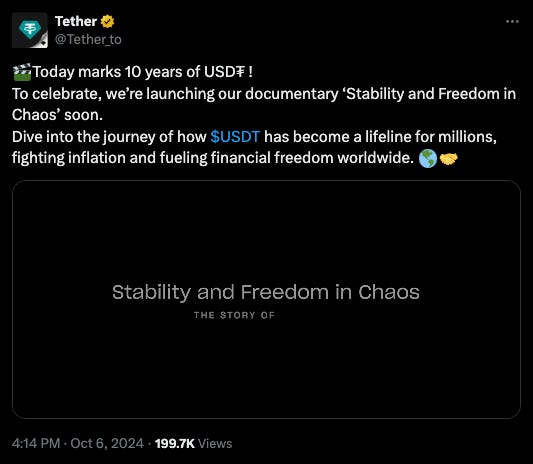This time for Africa? 💃
Sub-Saharan Africa loves stablecoins. Nigeria? Big fan. Tether turns 10. Coinbase is delisting some stablecoins? $147 million outflows for the week. Banks to trial Swift?
Hello, y'all. The music quiz game that you want to play. Over 1.7 million plays and music fandom to flex. Who are you playing with then 👇
As the global cryptocurrency market continues to evolve, Sub-Saharan Africa has emerged as a surprising leader in adoption and innovation.
The recent Chainalysis report on cryptocurrency usage in the region reveals a complex landscape of opportunity and challenge.
Accounts for only 2.7% of global crypto transaction volume.
Received approximately $125 billion in on-chain value between July 2023 and June 2024, a $7.5 billion increase from the previous year.
Stablecoins have become crucial to Sub-Saharan Africa's crypto economy, accounting for approximately 43% of the region's total transaction volume.
This trend is driven by
Foreign exchange crises in many African countries
Need for reliable value storage in volatile economies
Facilitation of international payments and cross-border trade
Two words: Currency devaluation.
"We have repeatedly noted an association between currency devaluation and stablecoin adoption," says Eric Jardine, Chainalysis' Cybercrimes Research Lead.
Translation? When local money loses value, folks run to USD stablecoins faster than you can say "HODL".
Why the stablecoin fever? Chris Maurice, CEO of African crypto exchange Yellow Card, puts it bluntly.
"The banks don't have dollars, the government doesn't have dollars, and even if they did, they wouldn't give them to you."
No wonder stablecoins are looking pretty stable right now.
As Chainalysis puts it, the continent is "well-positioned to emerge as a global crypto leader."
Nigeria is leading the pack. It clocked $23.6 billion in stablecoin volume in the 12 months ending June 2024.
However, the stablecoin usage has dropped 38% in the country over the past year, according to DL News.
Government crackdown: The sharp decline comes in the wake of the Nigerian government's aggressive stance against foreign cryptocurrency exchanges.
In February, officials accused platforms like Binance, OKX, and KuCoin of foreign exchange racketeering, alleging their peer-to-peer services caused a 90% plunge in the naira's value against the dollar.
Binance in crosshairs: The world's largest cryptocurrency exchange has borne the brunt of Nigeria's ire. The government accused the company of money laundering and facilitating illegal currency speculation.
In a controversial move, Nigerian authorities arrested Tigran Gambaryan, a US-based Binance compliance executive, on money laundering charges in March. Gambaryan has been held without bail for nearly seven months, prompting international concern.
Despite economic turmoil, crypto adoption remains high
Nigeria's still the crypto king, raking in $59 billion in crypto transactions from July 2023 to June 2024.
The country still accounts for 40% of Africa's stablecoin transaction volume. 85% of Nigeria's transfers? Under $1 million. Looks like the little guys are running the show.
The country recorded $30 billion in total value received by DeFi services.
Ethiopia's joining the party too, with retail stablecoin transfers up a whopping 180% year-over-year.
Countries like South Africa are making strides in regulating the crypto sector, providing clarity for businesses and investors. Nigeria has also taken steps towards regulation with initiatives like the Accelerated Regulation Incubation Program (ARIP).
South Africa, in particular, is seeing increased institutional and professional-sized transactions in the crypto market. Traditional financial institutions are showing growing interest in offering crypto-related services, especially custody solutions.
Token Dispatch View
For many Africans, cryptocurrencies offer a lifeline in economies plagued by inflation, currency devaluation, and limited access to traditional banking services.
This surge in adoption is not merely speculative but demonstrate the region's appetite for alternative financial solutions.
Stablecoins, in particular, have become a crucial tool for preserving wealth and facilitating cross-border transactions in a region where such activities are often cumbersome and expensive.
This crypto revolution is not without its risks.
The lack of comprehensive regulation across much of the continent leaves users vulnerable to fraud and market volatility. Nigeria's recent crackdown on cryptocurrency exchanges, while heavy-handed, highlights the legitimate concerns governments have about capital flight and financial stability.
The challenge for African policymakers is to strike a delicate balance: harnessing the innovative potential of blockchain technology while protecting consumers and maintaining economic sovereignty.
South Africa's approach, which includes a licensing regime for crypto businesses, offers a potential model for the region.
As Sub-Saharan Africa continues to lead the world in DeFi adoption, with Nigeria at the forefront, we must recognise the transformative potential of these technologies.
They offer a path to financial inclusion for millions of unbanked Africans and could revolutionise remittances, a critical source of income for many families.
Yet, we must also be clear-eyed about the obstacles ahead.
Infrastructure deficits, regulatory uncertainty, and the need for greater financial literacy all pose significant challenges to sustainable crypto adoption in the region.
The future of cryptocurrency in Sub-Saharan Africa will depend on how effectively governments, businesses, and communities can collaborate to create a robust ecosystem that balances innovation with protection.
If successful, Africa could become not just a adopter of crypto technology, but a global leader in its development and application.
The Home for All the Music Lovers
Muzify - is more than just a platform; it's a journey into the world of music.
It provides an interactive experience through quizzes and exploration tools. For artists it’s a powerful tool for artists to connect with their fans.
Through custom quizzes artists can engage their audience, receive direct feedback, and build a loyal following eagerly anticipating their next release.
The platform offers a direct line to fans, fostering a sense of connection that goes beyond mere listening.
Coinbase to Delist Select Stablecoins in Europe
Coinbase will remove non-compliant stablecoins from its platform for European Economic Area (EEA) users by December 30, 2024.
Regulatory framework: This decision is in response to the European Union's Markets in Crypto Assets (MiCA) regulations, which took effect on June 30, 2024.
Compliance requirements: Under MiCA, stablecoin issuers must obtain an e-money license from at least one EU member state and adhere to strict rules regarding their backing treasury assets.
Impact on major stablecoins:
Tether's USDt has not yet secured an e-money license.
Circle's USDC and EURC have been compliant since Circle became the first official Electronic Money Institution in the EU in July.
User options: Coinbase plans to provide EEA users with options to convert their holdings into compliant stablecoins in the upcoming months.
Industry trends: Other exchanges, including Binance, OKX, Bitstamp, and Uphold, have already delisted non-compliant stablecoins like Euro Tether’s EURT and USDt since the rollout of MiCA guidelines.
Block That Quote🎙️
Tether CEO Paolo Ardoino
“I think that Tether is the best friend of the US government …”
In an interview to Cointelegraph as Tether approached 10-year anniversary.
Launch Date: USDt stablecoin launched in October 2014.
Ardoino claims Tether is a "best friend" to the US government, why?
Government Engagement: Tether is the only stablecoin company to onboard the FBI and US Secret Service.
Treasury Holdings: Holds approximately $98 billion in US Treasury Bills, making it one of the largest holders of US debt globally.
Market Growth:
Reached $1 billion market cap in 2017
Surpassed $100 billion by March 2024
Current market capitalisation stands at $120 billion
Simple Model: CEO Paolo Ardoino attributes success to a straightforward exchange model: dollars for USDt and vice versa.
Read more: Stablecoin That Conquered Crypto 👑
Celebrating birthday with a documentary?
In The Numbers 🔢
$147 million
That's the total outflows digital asset investment products saw last week, according to CoinShares' latest report.
Why the cold feet? Blame it on economic numbers.
“Higher than expected economic data last week, reducing the probabilities for significant rate cuts are the likely reason for the weaker sentiment amongst investor.”
Let's break it down
Bitcoin took the biggest hit with $159 million in outflows
Short-Bitcoin saw a tiny $2.8 million inflows
Ethereum wasn't spared either, waving goodbye to $29 million
But it's not all doom and gloom.
Multi-asset products: $29 million inflows mark their 16th consecutive week of gains. That's $431 million total, or 10% of AUM.
Canada and Switzerland are feeling bullish, with $43 million and $35 million inflows respectively.
Meanwhile, the US, Germany, and Hong Kong are heading for the exits. Uncle Sam led the charge with $209 million in outflows.
Trading volumes? Up by 15% to a cool $10 billion for the week in ETP investment products.
So, what's the takeaway? Investors might be playing it safe, but they're not abandoning ship. They're just spreading their bets.
SWIFT to Trial Crypto Transactions
Swift plans to begin live trials for digital asset and currency transactions in 2025.
The trials will explore applications in payments, foreign exchange, securities, and trade, including multi-ledger transactions like Delivery-versus-Payment (DvP) and Payment-versus-Payment (PvP).
Big moment for integrating tokenisation and public blockchains into existing financial systems, enhancing global financial infrastructure.
This initiative follows previous experiments with Ethereum and Chainlink to explore interoperability between public and private blockchains.
Objective: Seamless transactions across existing and emerging asset types using current Swift connections.
Bridging finance: Address fragmentation in the digital asset landscape by providing a unified access point for various digital asset classes and currencies.
Global participation: Banks in North America, Europe, and Asia will participate in the trials using Swift's platform.
PayPal has completed its first business payment using its stablecoin, PayPal USD (PYUSD), in a transaction with Ernst & Young through SAP's digital currency hub. Launched in August 2023, PYUSD currently has a market capitalisation of $699 million and underscores the growing adoption of stablecoins in corporate finance.
The Surfer 🏄
Japanese investment firm Metaplanet added 108.78 Bitcoin for $6.7m, raising its total to 639.5 BTC valued at around $40m. Dubbed "Asia's MicroStrategy," the firm mirrors MicroStrategy's strategy and recently earned $1.4m from Bitcoin put options.
Binance's market share dropped to 36.6% in September, a four-year low, amid regulatory challenges and declining trading volumes across centralised crypto platforms, according to CCData.
The Federal Tax Authority of UAE has amended VAT regulations to exempt transfers and conversions of digital assets, including cryptocurrencies, retrospectively from January 1, 2018. UAE wants to position as a crypto-friendly jurisdiction to attract more blockchain businesses.
If you want to make a splash with us, check out partnership opportunities 🤟
Our sponsorship storefront on Passionfroot 🖖
This is The Token Dispatch find all about us here 🙌
If you like us, if you don't like us .. either ways do tell us✌️
So long. OKAY? ✋













The rise of stablecoins in Africa highlights how necessity drives innovation. With currency devaluation and limited access to foreign currency, crypto provides a viable alternative for everyday financial needs. It's not just tech-savvy traders driving this – it's everyday people looking for stability in unstable economies.
Coinbase's decision to delist non-compliant stablecoins due to MiCA regulations is a wake-up call for stablecoin issuers. As more regions tighten crypto regulations, companies like Tether need to step up and ensure compliance to remain relevant in key markets like Europe.